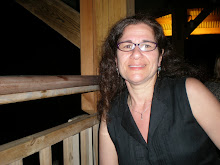Tuesday
June 1, 2010
A Jew and a Philipino are walking down the dirt road to the market in Mampong, Ghana and a local calls out “Obrani, et te say?” I should answer, Me hoy ye, but inevitably I answer in English. “I’m fine and you?” ….no this is not the beginning of a bad joke. The translation of ‘obrani’ is white. In this usage it’s like calling out ‘whitey’ or white one, how are you? My friend Toni (from Manilla, Philippines) and I were discussing how in most other cultures we would be perceived independently, an Asian and a white person. This was not derogatory at all. Clearly, we stood out in the throng of students, shoppers and merchants as a curiosity and surprise. People wanted to say hi and welcome us to the village.
We had a drumming lesson until 12. Yaw, our teacher, had to take the afternoon off. After lunch I went to find a special treat for Abbie for her birthday. I found a liquor shop in town and bought 3 bottles of Spanish white wine. I asked the kitchen staff to chill them. We had a great dinner complete with a home made birthday cake and wine. We all made Abbie feel that her 38th birthday was a special day even though she was far from her family and friends at home.
Drumming and dancing is part of the genetic structure of Ghana. In the area we are staying in, the families and merchants often pass by and stop to watch, listen or dance while we practice. Sometimes a local will smile at one of us, it’s a smile of approval Sometimes they will stare at you and motion to watch their arms as they show you where your rhythm should line up, helping you to get back into the right groove. If a local raises their right hand and shakes two fingers towards you that means they like your playing and send you a blessing.
The people of Mampong are very proud of the fact that we are here studying their culture. In the afternoon royal sets up the Kete drums for Tusa and I to review Gahu rhythms. In the different regions of Ghana there are different sets of drums associated with their rhythms. It is almost sacrilegious and pretty odd, to play one region’s rhythms on another region’s drums. If a local stopped to listen for a moment we would stop playing to explain that we didn’t have Ewe drums here and were substituting the Ashanti drums for the purposes of study only. It is moments like these that having English as a common language is helpful.
In Mampong, the weather has many personalities. Saying its hot today is not descriptive enough. The heat can feel warm with a light breeze that seems to cancel the heat. It’s like that New Bedford, 3PM breeze that cools off a summer day. Tuesday morning, during one of our 3 hour dance lessons, I finished 1.5 litres of water before noon, the heat that morning was felt inside my body. By mid afternoon the air in Mampong became heavy and humid. My clothes were stuck to my body and I needed to sit down. A few of us sat under a tin roofed area and shared cold beverages. We cannot put ice in our drinks. Ice is made with tap water that is not boiled. This water is forbidden to a traveler it would be deleterious to our health.
The sky looked angry and began to slowly take over above us. The rain started beating down on the roof in a biblical way. Nearby roof gutters were gushing with water That smacked the ground as it splashed onto the ground. The percussive rhythms of this storm seemed to tell a story. The flowing water over the red earth street made small rivers that meandered around existing pot holes. Pot holes in desperate need of earth filled with water creating red mud baths.
This lasted most of the afternoon. The internet and electricity were down for the evening. Generators were switched on at the hotel but the city was black.
Friday, June 4, 2010
Subscribe to:
Post Comments (Atom)

No comments:
Post a Comment